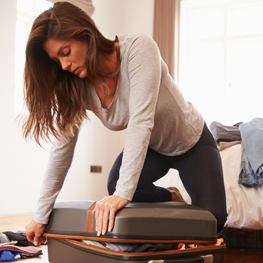
"Your son has pneumonia,” the doctor said. And I heaved a sigh of relief. When my two-year-old was recently ill, it was all arms to battle stations as we fought temperatures peaking 41.5oCelsius, (106.7oF), dehydration and sleeplessness. At the hospital, I was informed it could be either pneumonia or meningitis. So when it was confirmed that we’d escaped the latter, I was so relieved I nearly didn’t register what the doctor said next. “He’ll have to stay in the hospital for the next five nights so we can begin the antibiotics treatment and monitor him closely.” Oh.
A hospital stay with your loved ones can be unsettling and often traumatic. It becomes almost unbearable when the ill person is a child. It is distressing to see their suffering. You feel helpless to make them better. All you want to do is magically take the pain away, but all you can do is comfort and soothe them, and place your trust in the medical heroes. In such stressful situations, the last thing you want to worry about is running out of clean clothes or forgetting an asthma inhaler. If you’re a single parent, or a parent with other children at home, you may not be able to afford the time and luxury to keep going back and forth to your house to get what you want for the hospital stay. You must also pay attention to you - taking care of yourself so you are in the best possible position to look after your sick child.
So avoid all the unnecessary fuss once and for all, and ensure you carry an essentials bag that contains everything you need. But under all that strain, it can be difficult to think of what to pack. Here’s a handy list of items you’ll need if you ever have to stay overnight in a hospital with an ill baby or child.
What to pack for your baby/child:
What to pack for yourself:
It is also a good idea to keep a bag packed with spare items just in case an emergency should arise.
Once your child begins to get better, they will get more active and it will become difficult to keep them restrained within the confines of the hospital room. With intravenous infusion bottles, there is also the danger the long cords and tubes will get entangled in arms and legs or worse, around delicate necks at night as the child tosses and turns in sleep. Caregivers must remain alert to the dangers of pulling, breaking, bending or strangulation. Find activities to keep your child occupied. Carry read-aloud books, coloring books, toys, video games, play dough, etc. Also, you may want to keep a folder to carry the discharge paperwork in.
A hospital stay with an ill child can be a tremendously demanding time. With preparation and patience, you will hopefully get through this tough period on to happier days.
Devyani is a freelance writer, and a mother of two. She likes to eat chocolates, read comic books and try her husband’s patience.
Calgary’s Child Magazine © 2024 Calgary’s Child